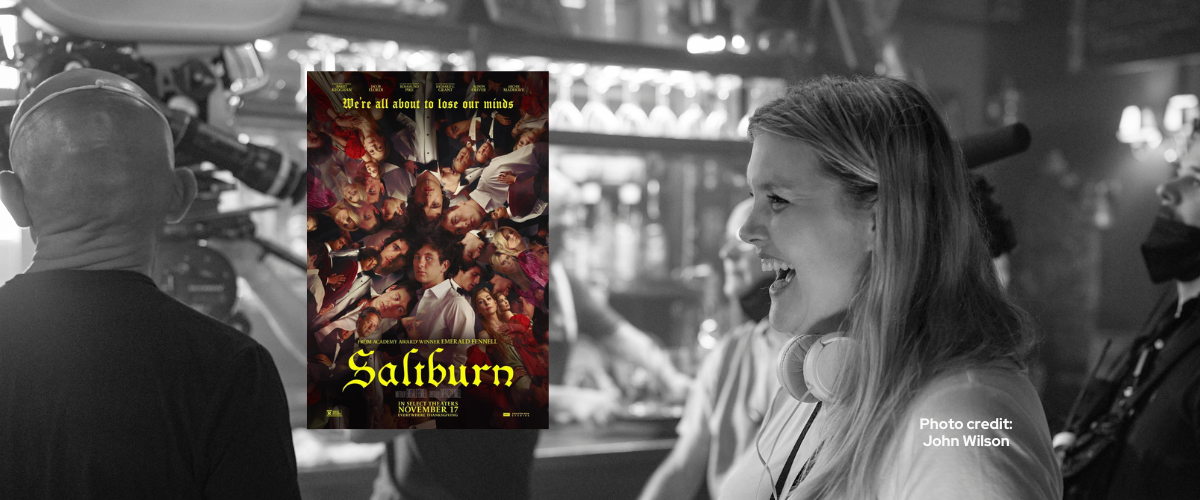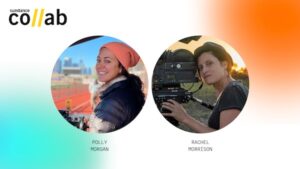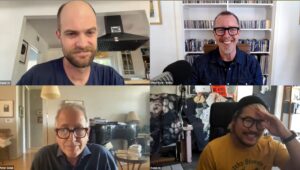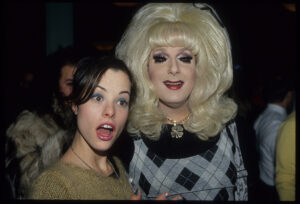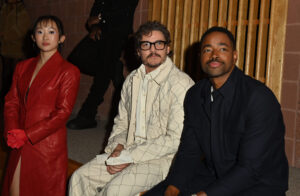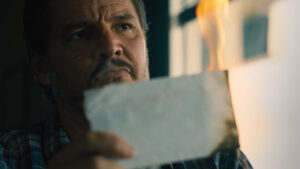By Lucy Spicer
From what she jokingly describes as a “hostile” hotel room in Los Angeles, Emerald Fennell virtually joins an excited group of viewers for a Sundance Collab Spotlight Event. “I am so indebted to Sundance. Sundance is the reason I’m here, because they showed my short film,” says Fennell, whose short Careful How You Go screened at the 2018 Sundance Film Festival. “It changed my life.” Fennell’s relationship with Sundance continued in 2020, when her feature directorial debut, Promising Young Woman, premiered at the Festival before going on to win an Academy Award for Best Original Screenplay.
Fennell’s sophomore feature, Saltburn, proved to be one of the most talked-about films of 2023, and now the film’s writer-director — and co-producer — treats Collab members to a discussion about the project and her filmmaking process. Part dark comedy, part gothic thriller, the visually stunning Saltburn follows Oliver Quick (Barry Keoghan) as he befriends the irresistibly aristocratic Felix (Jacob Elordi) and spends the summer at his family’s estate.
Discover some of our favorite quotes from the Spotlight Event below, including Fennell’s advice to first-time filmmakers and which universal feeling she hopes to convey with Saltburn.
On how Fennell’s scripts evolve:
“I have the draft, that first write-down that is the draft for seven years of, I don’t know, brain work, I suppose. And then I try not to touch it until it’s cast, until I’ve heard the readthrough and done the rehearsals. … I don’t want to actually necessarily rehearse scenes so much as talk about the characters, look at the way they speak, the way that they interact with each other, talk about their relationships, talk about the actors’ relationships with them. And then out of that will come really interesting stuff that then makes its way into the shooting draft. … Each actor will come with such beautiful stuff, such unique stuff. You really need to be able to fold that in, but fold it in early enough that it feels like a part of character, not that it’s been stitched on.”
On casting Barry Keoghan as Oliver:
“The closer you get to Barry, the less you know him. That is a very important thing when you’re dealing with a first-person narrator. There needs to be something that will remain kind of unknown, I think.”
On why Fennell writes people-driven stories:
“I am obsessed with people. I love meeting people. The process of publicizing a film can be very grueling — and bruising, actually — but it’s OK because I love meeting people, and I love talking to them. And everyone I talk to — you learn something, and if you’re interested in genuinely connecting with people, or you question your own motivations, you question why you’re interested in something. You’re always trying to interrogate why you’re responding to things the way you’re responding, and why you’re telling yourself you’re responding to something because you’re a good person rather than just a rubbernecker, or whatever it is. I’m always trying to interrogate my reactions to things and where they come from. … Put two people in a room together and it’s the most exciting thing in the world.”
On the nature of obsession in Saltburn:
“Sometimes you don’t really have control over the characters in a weird way, or how they present themselves to you. And Oliver was always Oliver, and so the nature of the desire that he feels, I hope, sort of feels universal. I hope that the way that this film works is that it should be relatable to anyone who’s loved anyone. And for me, it’s always about interrogating my own relationship with the things that I love, with the people that I love, with the people that I kind of become obsessed with, deeply, deeply, and what happens when you just feel like somebody’s reached inside you and grabbed you. And I don’t think that is singular, that it’s specific to any gender. … I just wanted to make something that felt real and honest to me, and that physically made me feel something.”
On approaching intimate or disturbing scenes:
“You have to feel safe to fail. You have to know that to try and make something special, to try and make something that connects with even just one person deeply, is to always be on the brink of failure, always be on the brink of something that doesn’t work, and that’s OK. And so I feel like with whatever we do, whenever we do it, however we work together, everyone knows that there will always be trust, there will always be honesty.”
Advice for first-time filmmakers:
“Trust yourself. Make sure that there’s somebody you believe who will give you stuff that is useful, because everyone will have an opinion. Trust yourself. If you’re at the point where you’re making your own thing, it is yours. And you have to fight for the way you want it to feel, because yours is a unique voice. And strive in the hardest, most grueling time of your life to find a connection with everyone you’re working with, to check in with them. Not only just for your own personal sanity and their sanity, but because the work will be better when you all connect together. You will survive it, you’ll make good stuff. You can make the most difficult, beautiful thing in 20 minutes if you need to, if you love each other and trust each other. That’s the most important thing for me.”
Saltburn is currently available to stream on Amazon Prime Video. Check out the full hourlong discussion and Q&A for more from Fennell, such as her reason for choosing a 4:3 aspect ratio and which films with queer themes helped to inspire Saltburn. And for updates on upcoming Collab events, courses, and discussions, sign up for Sundance Collab’s newsletter here.

